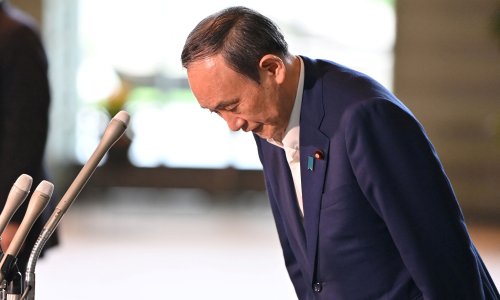Japan’s Prime Minister Steps Aside

Photo: KAZUHIRO NOGI/AFP/Getty Images
Today Prime Minister Yoshihide Suga of Japan announced that he will not run for reelection as leader of the ruling Liberal Democratic Party (LDP), effectively ending his term as prime minister less than a year since he took office. Several LDP members will likely run to succeed him in a party election later this month in advance of a general election later this fall. Suga’s announcement raises some concerns about instability in Japanese politics as Japan tries to tackle Covid-19 and implement a foreign policy strategy centered on close ties with the United States and other like-minded partners in Asia.
Q1: What happened?
A1: Suga was elected a year ago after his predecessor Shinzo Abe stepped down for health reasons with one year left in his term as party president. Suga served as chief cabinet secretary under Abe for nearly eight years and was expected to further implement Abe’s policy agenda. He started off strong, but his approval rating plummeted as the public became frustrated with his management of the Covid-19 crisis, which was hampered by weak mitigation measures (for fear of an economic downturn), a poor communications strategy, a delayed vaccination campaign, and a recent surge in cases. Japan’s total number of cases is relatively low compared to other countries, but a recent surge caused by the Delta variant accelerated a downward spiral in his support rate to below 30 percent in some polls. Suga was expected to stand for reelection as party leader this month but recently flirted with postponing the LDP leadership race to buy time. That notion was rebuffed by party leaders, who also rejected Suga’s effort to reshuffle some party leadership posts ahead of the LDP leadership race, effectively sealing his fate. His decision to step aside sets the stage for a wide-open contest to succeed him in the LDP election expected to take place on September 29.
Q2: Who is in the running to succeed Suga?
A2: Fumio Kishida, who ran against Suga last year and served as foreign minister under Abe, is the only party member to have formally announced his candidacy thus far in a race expected to focus almost exclusively on how to manage the Covid crisis. Former defense minister and LDP secretary general Shigeru Ishiba, who ran against Abe and fell short against Suga last year, could also jump in the race. Other possible contenders include Taro Kono, who served as both foreign minister and defense minister under Abe and is currently managing the Covid vaccination campaign in the Suga administration, as well as former communications minister Sanae Takaichi and LDP deputy secretary general Seiko Noda, female leaders representing the conservative and progressive wings of the LDP, respectively. Candidates will scramble to assess their prospects in the coming days before the formal leadership campaign kicks off in mid-September.
Q3: Will this affect Japan’s relationship with the United States?
A3: There is a consensus within the LDP on the foreign policy strategy Abe developed emphasizing a strong U.S.-Japan alliance, networking with like-minded countries in frameworks such as the Quad (the United States, Japan, Australia, and India), and rulemaking in various policy areas under the free and open Indo-Pacific construct also embraced by the United States. Suga was the first foreign leader to meet with President Biden in Washington this past spring, and the two leaders unveiled a robust agenda across a range of issue areas including defense, emerging technologies, infrastructure development, and climate change. Suga’s successor will likely carry that agenda forward, though new leaders tend to introduce their own priorities and that could result in slight changes in policy emphasis. Japan’s strategic trajectory, based fundamentally on defense cooperation with the United States, will likely remain consistent. The question in the wake of Suga’s sudden departure is whether Japan can produce a new leader with enough staying power to implement alliance initiatives.
Q4: What’s next for Japanese politics?
A4: Suga’s successor as LDP president will be appointed prime minister, as the ruling coalition led by the LDP enjoys a large majority in the Diet (parliament). But the new face of the LDP will have to quickly develop a campaign strategy for an election in the Lower House of the Diet expected in October that could prove contentious given public frustration with the response to Covid-19. The LDP remains more popular in public opinion polls than the opposition Constitutional Democratic Party of Japan (CDP), which has traditionally struggled to articulate a clear alternative to LDP policies. But the upcoming election could provide the CDP with a sounding board to capture the attention of the public in ways it has not in the past. At this stage the LDP is generally expected to at least retain a majority, but a weak showing could necessitate the formation of new coalitions to keep its grip on power. The sudden tumult in Japanese politics also raises questions about a potential return to political instability, a string of short-term leadership that followed previous prime ministers who enjoyed long tenures such as Yasuhiro Nakasone, Junichiro Koizumi, and Shinzo Abe after his first term. Japan’s strategic trajectory appears firmly in place; the task now is to find a new leader with the power to implement key objectives.
Michael J. Green is senior vice president for Asia and Japan Chair at the Center for Strategic and International Studies (CSIS) in Washington, D.C., and director of Asian studies at Georgetown University. Nicholas Szechenyi is a senior fellow and deputy director of the CSIS Japan Chair.
Critical Questions is produced by the Center for Strategic and International Studies (CSIS), a private, tax-exempt institution focusing on international public policy issues. Its research is nonpartisan and nonproprietary. CSIS does not take specific policy positions. Accordingly, all views, positions, and conclusions expressed in this publication should be understood to be solely those of the author(s).
© 2021 by the Center for Strategic and International Studies. All rights reserved.

